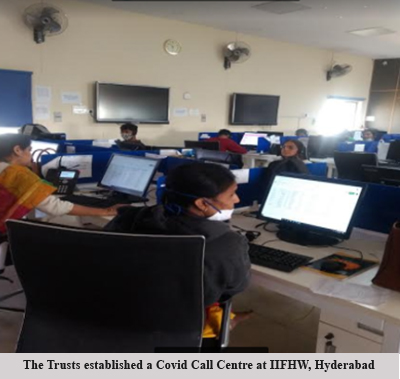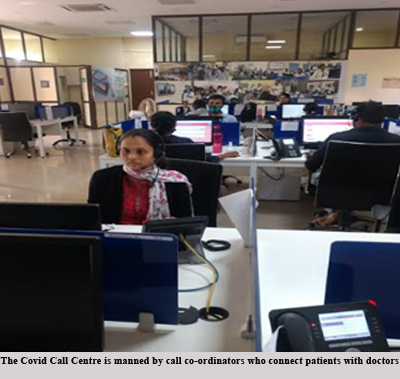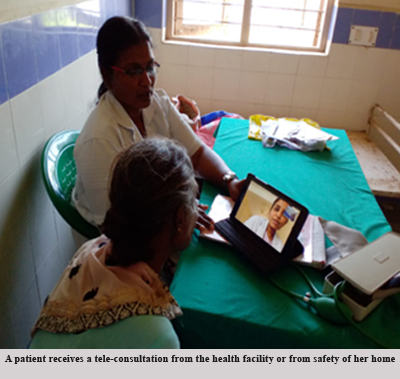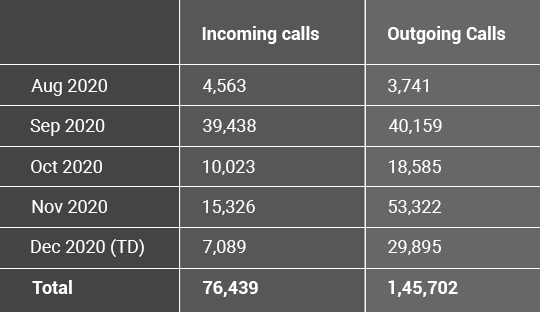Tata Trusts joins the Telangana government’s battle against Covid
The Covid-19 pandemic morphed almost overnight into a global health crisis. As the first of such catastrophes in several decades, the Corona virus outbreak caught several countries unprepared or under prepared, and is still posing critical challenges to public health, research, and medical communities worldwide. It is a tragedy unfolding before our eyes, day after day, as the health, social and economic consequences of the pandemic impact the daily lives of millions of people around the globe.
Facing the challenge
 It was apparent right from the beginning that India’s health ecosystem did not have the arsenal to fight a battle of this magnitude. Apart from the woefully underequipped hospitals and medical workers who weren’t trained to fight an epidemic of global proportions, there was a lack of clear guidelines on how to contain the spread of the virus, or even credible information on hygiene and safety precautions. Exacerbating the situation was the lockdown in the nation.
It was apparent right from the beginning that India’s health ecosystem did not have the arsenal to fight a battle of this magnitude. Apart from the woefully underequipped hospitals and medical workers who weren’t trained to fight an epidemic of global proportions, there was a lack of clear guidelines on how to contain the spread of the virus, or even credible information on hygiene and safety precautions. Exacerbating the situation was the lockdown in the nation.
For the Tata Trusts, the way ahead was clear. There had to be a structure to their efforts to contain the infection. And they weren’t going to go about it alone. So began an immense pan-Indian multi-pronged endeavour to meet the needs of the moment. The idea was to help support India’s healthcare system, and work with Tata Group companies and other organisations to surmount the challenges.
 And challenges there were many – the lockdown meant that most employees were working from home. Commodities were in short supply, delivery logistics was complicated, and putting together several teams was incredibly difficult. Yet, the Trusts plunged into this yeoman task, leveraging the talent and commitment of their people across geographies.
And challenges there were many – the lockdown meant that most employees were working from home. Commodities were in short supply, delivery logistics was complicated, and putting together several teams was incredibly difficult. Yet, the Trusts plunged into this yeoman task, leveraging the talent and commitment of their people across geographies.
As guidelines and advisories from the Indian Council of Medical Research (ICMR) and the World Health Organisation started to come in, the pandemic response took on additional urgency. The Trusts stepped up their efforts to contain the spread of infection, expanding their outreach by collaborating with state and local governments to initiate a multi-pronged action plan. In Telangana, for instance, the Trusts and the state government moved quickly to meet the challenge head-on.
Personal Protective Equipment (PPE)
Frontline workers needed personal protective equipment (PPE) including gloves, masks, face shields and gowns to protect them from infection. The Trusts procured PPE and provided them free of cost to frontline workers and hospital care givers. The Trusts have also distributed PPE kits to four branches of the Government of Telangana in 5 months.
Raising awareness
Societal compliance with health guidelines is a critical factor in containing disease transmission. The Trusts have gone to great lengths to raise societal awareness of health and safety guidelines, sharing a wide range of Information, Education and Communication (ICE) material including digital data, audio and video messages in collaboration with multiple partners. Local celebrities were roped for videos that were uploaded on YouTube, so the messages would resonate with the general populace. The video links were circulated by SMS to the beneficiaries of the Trusts’ projects across the state. Approximately 100,000 beneficiaries were reached through this awareness campaign and sensitised on COVID-19.
Centralised Communications
 For the campaign to succeed, coordination between district and state officials was critical. A 24/7 coordination centre was set up at short notice in the Trusts’ tele-health facility at the Government of Telangana’s Indian Institute of Health and Family Welfare (IIHFW). A senior IAS officer headed communications, reporting directly to the Chief Minister’s Office. Working in shifts, four doctors and two associate professors manned the centre, answering calls from district administrators like the collector and deputy collector, and from district hospitals. They checked the guidance readiness of district health facilities and teams; the protocols to be followed for Covid patients’ admission to hospitals; ambulance services, and requirement of medicines, among other details. The Trusts helped to set up a landline number and call distribution to this line. 24/7 technical support was also provided to the communications centre.
For the campaign to succeed, coordination between district and state officials was critical. A 24/7 coordination centre was set up at short notice in the Trusts’ tele-health facility at the Government of Telangana’s Indian Institute of Health and Family Welfare (IIHFW). A senior IAS officer headed communications, reporting directly to the Chief Minister’s Office. Working in shifts, four doctors and two associate professors manned the centre, answering calls from district administrators like the collector and deputy collector, and from district hospitals. They checked the guidance readiness of district health facilities and teams; the protocols to be followed for Covid patients’ admission to hospitals; ambulance services, and requirement of medicines, among other details. The Trusts helped to set up a landline number and call distribution to this line. 24/7 technical support was also provided to the communications centre.
Training
The Trusts have also been involved in capacity building for health workers, in collaboration with renowned institutions like Christian Medical College (CMC), Vellore and Care Institute of Health Sciences (CIHS), Hyderabad. CMC provided virtual training to health care providers from both government and private health sectors in Telangana.

Call centre for monitoring home-isolated Covid-positive patients
Unlike other states which were setting up facilities to accommodate Covid-positive patients, the Government of Telangana followed ICMR guidelines to quarantine patients who tested positive, were asymptomatic, or suffered from mild Covid-19 symptoms in their own homes. To alleviate patient stress and to assure them of quick medical attention if necessary, the Trusts established a toll-free number based call centre, backed by real time coordination with government hospitals and ambulances. Partnering with third-party vendors, the Trusts set up the toll-free number with incoming and outgoing facilities activated within two days.
The call centre coordinators deployed by the government were trained by the Trusts’ team and taught how to operate the Avaya phones, log in to the reporting system, report calls and connect callers to medical providers for tele health consultations. The callers also follow up with every self-quarantined patient on a daily basis, answering their queries.
Patients can also call the centre round the clock to report any change in their symptoms. Doctors answer incoming calls related to symptoms, testing centres, sanitisation protocols, home isolation, etc. Based on developing any further symptoms or complications, the doctors also coordinate to send 108 ambulances to shift patients to nearby hospitals.
Covid patients followed up

Virtual consultation
As lockdown continued, private and government hospitals shut down non-essential services like outpatient consultations. Patients suffering from BP, diabetes, fever, cough and other minor diseases had nowhere to go. People in rural and semi-rural areas were the worst hit.
The Trusts sprang into action, leveraging technology to connect care-seekers and caregivers. The Trusts had already been working on a tele-health programme as part of their Health Systems Transformation Platform in Telangana. When the state government co-opted the Trusts to help ease the transition, the Trusts tapped into their readily available network and trained manpower, providing computers and Avaya phones, as well technology and IT application support. Within a short time, 15 medical officers were deputed by the government in a phased manner to provide telemedicine to patients. They were trained to digitise patients’ records, and to use the Tele Health process flow on the IT platform.
Appointments for tele-consultations were booked through a toll-free number. The Trusts’ team attended to the calls, answered patients’ queries, and maintained records of calls and consultations.
Patients from the Health and Wellness Centres (HWCs) were connected to doctors at CCC, who provided consultation via audio or video sessions based on the patients’ convenience. Patients who called from their residences could also avail of tele-consultations through a government-provided toll-free number (180059912345). Patients’ EMR records were digitised and e-prescriptions were shared electronically with the patients.

